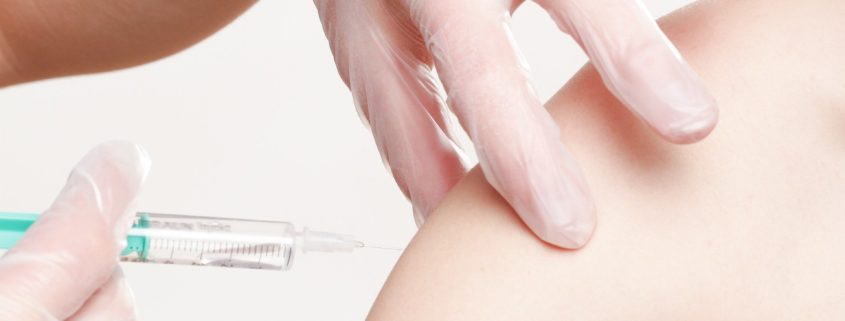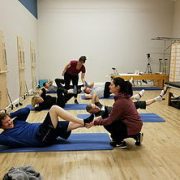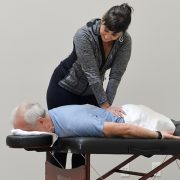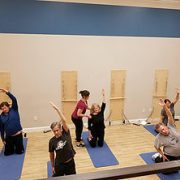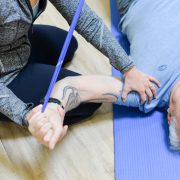Are Cortisone Shots the Best Option for Chronic Shoulder Pain?
Nagging shoulder pain can be extremely annoying.
But when it starts to interfere with things you love to do – you can’t help but wonder – is it time to get a cortisone shot?
When you’ve got dull, nagging shoulder pain that just won’t go away, cortisone shots suddenly seem very attractive. They’re quick, easy, and seemingly harmless – right? Not so fast. Just because cortisone shots for shoulders are routine, popular, and often effective at getting rid of pain – it doesn’t mean they are the best or right thing to do.
What is a cortisone shot and how does it work?
Cortisone shots are typically administered to reduce localized inflammation inside a joint or tendon. In shoulders, it’s very common to use this procedure to reduce pain from arthritis, bursitis, rotator cuff tendonitis, and even frozen shoulders. When inflammation is confirmed to be the root source of your shoulder problem, and it’s not going away with medication, on its own, or with physical therapy – a cortisone shot may be the right course of action. But what if inflammation is not the root source of your problem? What if inflammation is actually a secondary symptom? This is where most of the confusion lies in the medical community. While it might not seem like a big deal (pain is pain, right?) – you put yourself at risk for irreversible damage to your joints and tendons if you keep getting cortisone shots when you don’t actually need them.
So how do you know if a cortisone shot is best for your shoulder pain?
Step one is making sure you’ve correctly identified the root source of your shoulder pain. Is it a chemical source – where the inflammatory process to heal something injured within your shoulder has gone haywire? Or is it a mechanical source – meaning the source of your pain is due to poor movement habits and imbalances in your body. The difference matters – and will determine whether or not a cortisone shot is, indeed, the best option for your chronic shoulder pain. Let’s look at the differences between the two sources of pain to help you figure out when a cortisone shot is best for your shoulder pain – versus when you should hold off.
“Chemical pain”
Chemical pain is normal (until it isn’t) – and it’s the result of your body’s natural inflammatory response to injury. When your body is trying to heal from an acute injury or tissue damage, a complex chemical reaction occurs between your blood and other cells that involves the releasing of chemicals to “flush out” the injured area and start the healing process. A good example of this is when you fall and sprain something. The sprain causes tissue damage – so your body creates inflammation to heal it. Normally this process has a start and an end. As your pain subsides, so does this chemical process called inflammation. But sometimes this inflammatory process can get out of control for various reasons. And the accumulation of toxic chemicals sticks around (they don’t ever flush out or go away). The result is constant irritation to your nerve endings and surrounding tissues. You’ll experience constant, dull pain (even at rest) that will appear extremely sensitive to any and all movements. There will be no reliability as to what makes your shoulder feel better – or worse. As you’ll read below – the presentation of shoulder pain due to an underlying chemical cause behaves quite differently from shoulder pain due to a mechanical cause. When it’s chemical – a cortisone shot is often necessary – and the best option for your shoulder pain
“Mechanical pain”
Mechanical pain is responsible for 80% of all shoulder pain. The hallmark sign of mechanical pain is that your pain will come and go based on certain activities, movements, or positions. It’s not constant and throbbing like with chemical pain. You’ll find, for example, that your shoulder pain eases with exercise, movement, and certain positions – while other times it seems to have a mind of its own and will hurt constantly. But typically, you’ll have some sense about things you can do to ease and/or aggravate your shoulder pain. And this is what makes mechanical pain so confusing – because when you’ve aggravated it – your shoulder will feel inflamed. But the presentation is different from that I’ve just described above, namely, your pain comes and goes. This type of inflammation is a symptom – and not the root cause of your shoulder pain. A cortisone shot may work temporarily to abolish this type of shoulder pain, but it’s going to keep coming back until you address the root mechanical reason that is causing the shoulder inflammation. What you risk here is getting repeated cortisone shots in your shoulder because you think they are working – when they are only serving as bandaids.
The verdict?
For chemical pain, a cortisone shot is likely the best option for getting rid of your shoulder pain. But for mechanical pain – it’s not. For shoulder pain that is mechanical, you fix it naturally, with specialized and corrective movement strategies. The tricky part here is distinguishing between primary inflammation that’s gone haywire versus secondary inflammation that is responding to activities, overdoing it, or simply the way you move. Don’t try to figure it out yourself – let a mechanical pain expert do that for you.
Are you local to Portsmouth, NH?
Consider speaking to one of my specialists for FREE by clicking HERE.
Dr. Carrie Jose, Physical Therapist and Pilates expert, owns CJ Physical Therapy & Pilates in Portsmouth and writes for Seacoast Media Group. To get in touch, or reserve a seat in her upcoming free Masterclass for headaches, neck & shoulder pain – email [email protected] or call 603-380-7902

